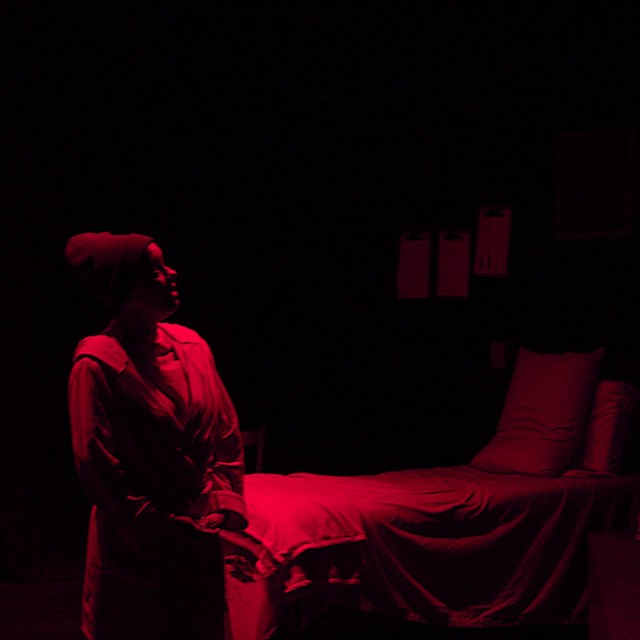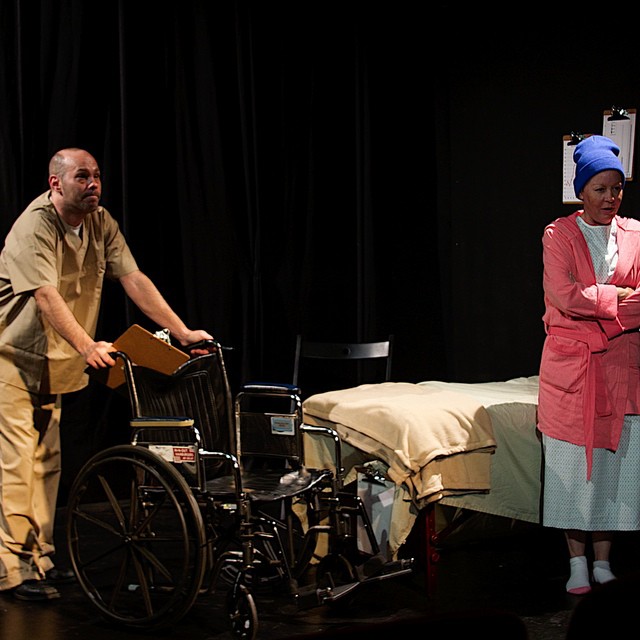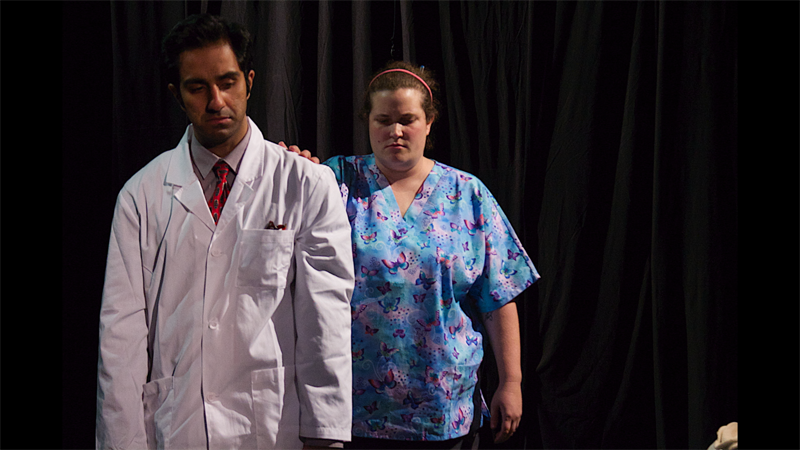Too much meddling with a Pulitzer Prize winner, along with an otherwise effective Kelly Carlton’s unwillingness to “go all the way,” make Stage Against The Machine’s revival of Margaret Edson’s Wit a no-go despite co-director Carlton’s often quite moving work as Vivian Bearing PhD and a couple of terrific supporting turns.
To paraphrase English poet John Donne, Death is not at all “too proud” to come knocking on Vivian’s door when the 50-year-old university professor and Donne scholar finds herself forced to look her mortality squarely in the face without the support of a life partner, surviving family members, or friends made along the way.
Informed of her Stage IV Ovarian Cancer by a doctor who would have flunked out of med school had Bedside Manner been a required class, Vivian finds herself facing an eight-month treatment so aggressive she will experience a hell most of us can scarcely imagine.
 If Wit forces us to accompany Vivian on her terrifying journey, Edson’s one-and-only produced play does so with so much humor, heart, and yes, wit, that rather than turn into the depressing TV Movie Of The Week it could have been in lesser hands, Wit can, if done right, prove to to be a truly inspirational, and often laugh-out-loud ninety minutes of theater. (Stage Against The Machine’s revival runs an additional ten minutes or so, the result of some slow pacing and the aforementioned directorial “tweaks.”)
If Wit forces us to accompany Vivian on her terrifying journey, Edson’s one-and-only produced play does so with so much humor, heart, and yes, wit, that rather than turn into the depressing TV Movie Of The Week it could have been in lesser hands, Wit can, if done right, prove to to be a truly inspirational, and often laugh-out-loud ninety minutes of theater. (Stage Against The Machine’s revival runs an additional ten minutes or so, the result of some slow pacing and the aforementioned directorial “tweaks.”)
Playwright Edson has Vivian speaking directly to the audience in “lecture” mode as she undergoes her debilitating treatment of experimental chemotherapy, recalling her childhood, her teaching career, and the decidedly uncomfortable moment she received her diagnosis from that business-only M.D.
As Wit unfolds, we discover in flashbacks just how overbearing and callous Vivian had been towards her students, an arrogance and cold-heartedness now returned to her by the medical team in charge of her case.
Still, if anything helps Vivian survive eight rounds of the most horrific chemotherapy known to medical science, it is her wry sense of humor.
Take for instance when the often annoying young research M.D. assigned to her case (a former student to whom she had given an A-) leaves her supine, legs spread for a pelvic examination in order to go get a female to be in the room with him per hospital regulations, and Vivian blurts out, “I wish I’d given him an A!”
Later, as she begins to see her life in a much different light, Vivian finds herself reflecting on time (“It goes so slowly and yet it is so scarce”) and the paradox of a treatment which “imperils my own health.”
Yes, indeed, if ever there were a “role of a lifetime,” it is Vivian Bearing, PhD, and it is understandable why Carlton would choose to cast herself in the role. It is also understandable that any actress might hesitate before undertaking the two things it requires of its leading lady—a shaved head and full-frontal nudity. Other actresses—Kathleen Chalfant and Cynthia Nixon off-and-on Broadway, Emma Thompson on film, and Karesa McElheny here in Los Angeles—have faced their fears and jumped into the role (bald) head first.
 That Carlton chooses rather improbably to wear a stocking cap throughout the play is the more easily excusable of her sins against Wit. That she not only opts to forgo the nudity which Edson’s script specifies in no uncertain terms but that she and co-director Travis Stanberry give Edson’s ending a trivialized rewrite, thereby robbing both Vivian and audiences of the transcendent beauty of “the instant she is naked, and beautiful, reaching for the light” (Edson’s stage directions, which they have ignored) is criminal.
That Carlton chooses rather improbably to wear a stocking cap throughout the play is the more easily excusable of her sins against Wit. That she not only opts to forgo the nudity which Edson’s script specifies in no uncertain terms but that she and co-director Travis Stanberry give Edson’s ending a trivialized rewrite, thereby robbing both Vivian and audiences of the transcendent beauty of “the instant she is naked, and beautiful, reaching for the light” (Edson’s stage directions, which they have ignored) is criminal.
This is indeed unfortunate since Carlton does for the most part give us Vivian in her many vivid colors—her icy sarcasm, her intelligence, her pluck, her vulnerability, her strength, and her wit.
Two supporting performances stand out.
 Charismatic Rishi Arya takes Dr. Jason Posner, a former student of Vivian’s whose passion for research blinds him to the fact that he is dealing with a living, breathing human being, and turns him from potential villain to unwitting hero, and never more so than in the scene in which Jason discusses with Vivian the way that cancer cells “replicate forever.” “Cancer is awesome,” Arya declares, his dark eyes bright with wonder. Simply put, I can’t wait to see more of this peformer’s work.
Charismatic Rishi Arya takes Dr. Jason Posner, a former student of Vivian’s whose passion for research blinds him to the fact that he is dealing with a living, breathing human being, and turns him from potential villain to unwitting hero, and never more so than in the scene in which Jason discusses with Vivian the way that cancer cells “replicate forever.” “Cancer is awesome,” Arya declares, his dark eyes bright with wonder. Simply put, I can’t wait to see more of this peformer’s work.
A refreshingly unactorish Alicia Deyer is very good indeed as nurse Susie Monahan, Wit’s voice of reason and humanity. Though the role is peripheral in early scenes, later when Susie counsels Vivian on the need to decide what will be done should her heart stop beating, and subsequently, when the nurse goes into attack mode as a small army of hospital doctors and technicians attempt to resuscitate Vivian against her will, Deyer’s lamb of a Susie turns tigress to powerful effect.
In contrast to Arya and Deyer, Kathleen Rubin and Bill Weldon come across tentative and under-rehearsed, she in two brief scenes as the poetry professor who inspired the young Vivian and later becomes her sole hospital visitor, he as the doctor who informs Vivian of her terminal illness and prescribed treatment like a dentist instructing a patient in how to use a bleaching kit, and as five-year-old Vivian’s cold fish of a father, who does at least teach her the meaning of “soporific.”
Linden East and Francis Badía do first-rate work as lab technicians, clinical fellows, students, and code team, Stanberry less so, and that includes his annoying, intrusive musical pre-show “entertainment.”
Also irritating is the program’s lack of cast bios, a must for theatergoers curious to know actors’ credits.
Some of Stanberry’s and Carlton’s directorial touches work, including the use of cast members as sound-effects-producing x-ray machines. (There’s one sound and lighting effect that is every bit as frightening as it is meant to be.) Others backfire, including a houselights-up interruption, Dr. Kelekian’s ridiculous golf swing practice while informing Vivian of her prognosis, and an embarrassingly out-of-place disco-danced curtain call in which Carlton appears in full makeup and shoulder-length blonde tresses.
Piper Moretti and Jason Dallas have created a complex, well-executed lighting design. Deyer’s costumes are perfectly fine as are most of her props, with the exception of this week’s LA Times Calendar section for a flashback to the 1950s. That there is little in the way of scenic design would hardly matter in a better directed production.
On a more positive note is Stage Against The Machine’s pay-what-you-want policy, with thirty percent of all ticket donations going to the charity Cuck Fancer.
Tristan James is executive producer. Damian Robinson and Moretti are producers and Moretti stage manager. Gay Freebern is assistant stage manager/tech.
I’ve seen two absolutely superb L.A. productions of Wit. Sadly, despite hopes to the contrary, this one is not number three.
Lounge Theatre, 6201 Santa Monica Boulevard. Hollywood.
www.satm.org
–Steven Stanley
January 4, 2015
Tags: Los Angeles Theater Review, Lounge Theatre, Margaret Edson, Stage Against The Machine



 Since 2007, Steven Stanley's StageSceneLA.com has spotlighted the best in Southern California theater via reviews, interviews, and its annual StageSceneLA Scenies.
Since 2007, Steven Stanley's StageSceneLA.com has spotlighted the best in Southern California theater via reviews, interviews, and its annual StageSceneLA Scenies.







 COPYRIGHT 2025 STEVEN STANLEY :: DESIGN BY
COPYRIGHT 2025 STEVEN STANLEY :: DESIGN BY